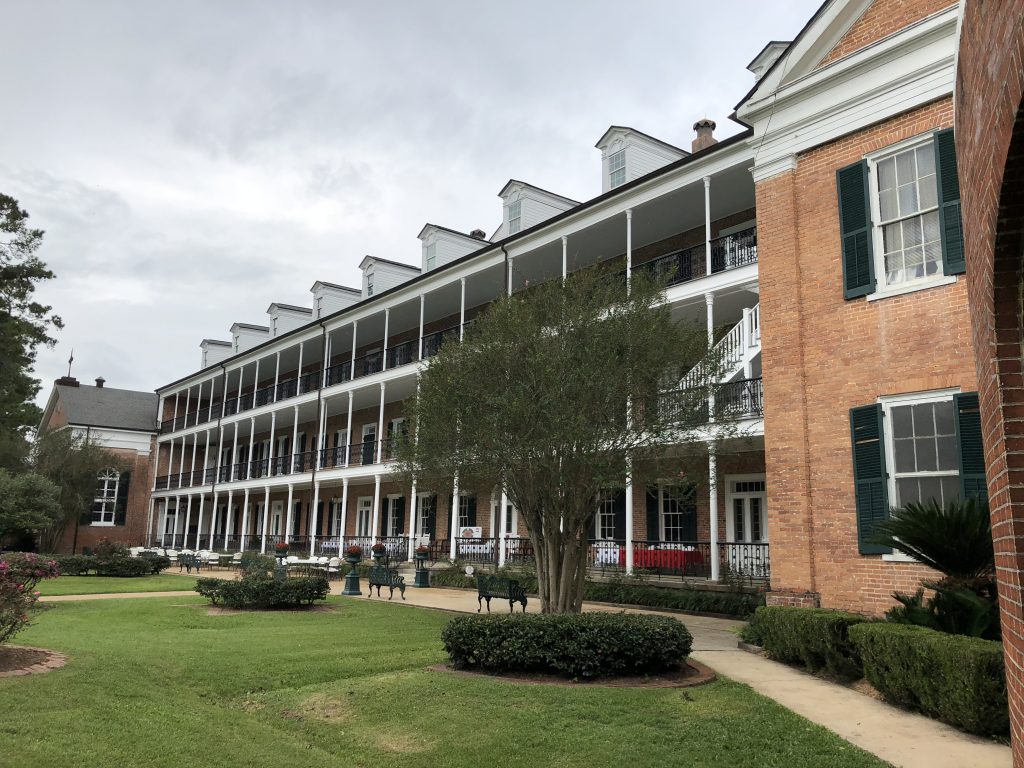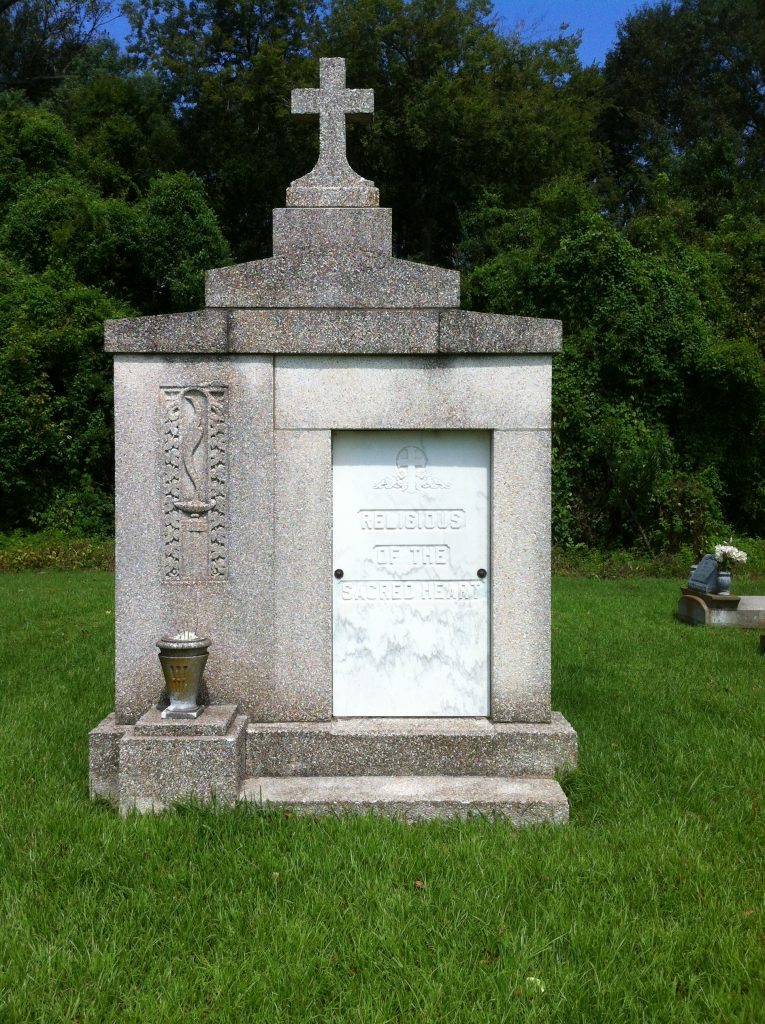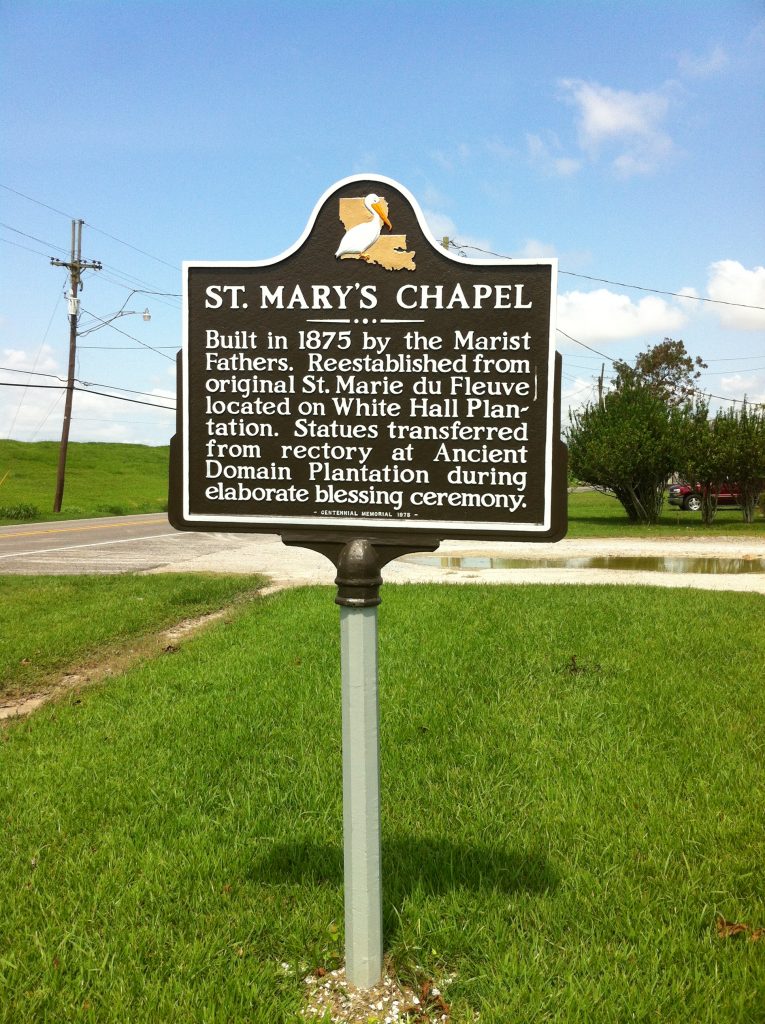Sister Regis did not think she could get through the day without dying, so great was her joy. She repeated this so often that I began to be afraid it would happen.—Rose Philippine Duchesne, RSCJ
The years of westward expansion fascinate me. I think of them as starting in 1803 when the young United States purchased the Louisiana Territory from France, a willing seller interested in financing the Napoleonic Wars. With no Google Maps at the time, the nation’s third president, Thomas Jefferson, sent Meriwether Lewis and William Clark on an expedition to explore and map the newly acquired lands. People from around the globe followed with hearts full of dreams and, while the Louisiana Purchase doubled the size of the nation, the world was getting smaller with the introduction of new technologies.
Missionaries came to the frontier to serve settlers who shared their religion and to convert both newcomers and indigenous peoples. They brought with them the most precious gifts they could offer, namely faith and education.
Saintly Correspondence
So, when Nancy Hamilton asked if I might help her research a couple of her ancestors who had lived during that time, I jumped on the opportunity. Nancy and I were classmates at the Academy of the Sacred Heart in Grand Coteau, Louisiana, in the 1960s. (A more famous former student is Selma Hayek, https://www.facebook.com/watch/?v=445121860174642.) And her relatives were two early novices of Philippine Duchesne, founder of the Society of the Sacred Heart in North America., the order that educated us. They were Mathilde (Xavier) Hamilton, born in 1802, and Eulalie (Regis) Hamilton, born in 1805.

Nancy provided me with a few documents, including an obituary for Regis. It told that the sisters were educated largely by their grandmother, whose home in Ste. Genevieve, Missouri, “was open to all missionary priests, particularly those fleeing the French Revolution.” They enrolled in the Sacred Heart boarding school in Saint Ferdinand, Missouri, as soon as it opened and in 1821 they entered “the first novitiate of the Sacred Heart in America—poor but very fervent: a ‘garden of delight’ for Eulalie and ‘a glorious battlefield’ for Mathilde,” according to Regis’s obituary.
In 1823, after making her final vows, Mathilde was sent to Convent, Louisiana, to help establish a school there.
“It was a cruel separation for the sisters. They accepted it generously and were not to see each other again on earth,” Regis’s obituary states. “In 1827 while answering the Mass for a missionary, she was astounded to hear Mathilde in the prayers for the deceased. Immediately after the Mass, Mother Duchesne called her to tell her of their loss.”
With that overview, I wasn’t sure where to turn with this project, but I recognized a likely information source when I came across Philippine Duchesne, Pioneer on the American Frontier (1769-1852): Complete Works. This two-volume compendium contains 656 letters written by Philippine, as well as some journals and other writings. Published in 2017 in French and released in 2019 in English, it’s the Rosetta Stone for understanding the lives of the two sisters, especially Regis, at least from the perspective of Mother Duchesne.
Philippine’s letters addressed personnel issues at four locations in Missouri—Saint Charles, Saint Ferdinand, Florissant, and Saint Louis—and four in Louisiana—St. Michael, LaFourche, Opelousas, and Grand Coteau. They spoke of schools for boarders, day students, and orphans, as well as fund raising, budgets and housing, along with other topics.
Many of Philippine’s letters were written to Mother Madeleine Sophie Barat, who founded of the Society of the Sacred Heart in 1800 in Paris. Theirs was a saintly correspondence, as both women were eventually canonized.
Great Expectations
Most of Philippine’s early letters about Regis mention Xavier, too. One of the first states:
God consoles us with three young novices who are well disposed, by the hope that they will soon be joined by two Americans [Mathilde and Eulalie Hamilton], who alone will be enough to sustain our work when God calls us to himself. The bishop had sent several priests to their home so that, hearing only English, they will become accustomed to speak it. The older one learned French with us in very little time and is able to translate into her language for us many works of devotion and class work, which are completely lacking for this people. A French woman will never become capable of writing English really correctly.
A May 1821 letter included an enclosure written by Mathilde Hamilton on behalf of her Regis and herself. It’s the only such enclosure I found in the book of Philippine’s writings and it states in part:
O Reverend Mother, how can we show our gratitude for the generosity of these zealous mothers who have sacrificed all that was most dear to them in the world and have come to search out the lost sheep in the solitary deserts of Louisiana? … My sister has taken the white veil before me (on May 4), even though she is younger. For after a year in the boarding school, I gave in to the wishes of my parents and returned to the family, so my entry into the novitiate was delayed.
In her letter, Philippine provided the following commentary:
This letter was written by the two subjects whom I regard as the foundation of the Society in the American nation. The younger one took the veil on the first Friday of May. You have no other novice with such a distinguished appearance and such a likeable character; she has taken the name Regis.
In March 1823, Philippine wrote about Xavier and Regis taking their first vows, along with Mary Ann Summers. The letter states:
They are the elite of our novices, the first two especially. Sister Regis did not think she could get through the day without dying, so great was her joy. She repeated this so often that I began to be afraid it would happen. That would have been a terrible loss for us; there is no obstacle to grace in that soul, and she does all the good she can.
After Xavier left for Louisiana, Philippine wrote about her, other than her obituary. She died April 1, 1927, of a sudden illness in the arms of her superior, Mother Eugenie Aude, who called her “our angel of peace.”
When Nancy contacted the Sacred Heart archives office in Saint Louis, she heard back from provincial archivist Carolyn Osiek, RSCJ, one of the three translators of the compilation of Philippine’s writings. Sister Osiek provided photos of Xavier’s possible final resting place. It’s a vault in the cemetery of Saint Mary’s Chapel, built by Marist Fathers in south Louisiana in 1875. The vault contains an inscription, “Religious of the Sacred Heart.”

Illnesses And Essential Assignments
Between June 2, 1826, when Regis made her final vows, and 1840, when Philippine was allowed to step down from her duties as superior of society in the U.S., two themes emerge. Regis was taking on increasingly important roles and she suffered significant illnesses.
In a May 31, 1828, letter, Philippine reported one nun had suggested making Regis superior at La Fourche in Louisiana. Philippine explained:
It would ruin her health and possibly upset her spirituality. The sudden death of her sister was a great shock, and she has been seriously ill several times since then.
Just a few weeks later, in a July 3, 1828 letter, Philippine stated:
I am obliged to withdraw Mother Regis [Hamilton} from Saint Ferdinand, even though she is very useful to Mother Octavie; but I absolutely need her to bring round the children to our house…
In a May 7, 1831, Philippine reported she thought Philippine might have smallpox, and in a June 19 letter that was largely about the scarcity of English-speaking teachers she confirmed the diagnosis, writing:
The only English teacher at Saint Ferdinand is in a bad way, and on the day of my feast, my bouquet was the beginning of a mortal illness of our only American teacher in Saint Louis [Regis Hamilton], a professed and the best of our religious. Smallpox was diagnosed; she has recovered from that, but a bad cough is making me fear the same end for her as for her sister [Mathilde].
In November 1831, Philippine wrote that Regis hadn’t been well since she had smallpox and the following February, she reported:
A very great cross for this house is Mother Hamilton’s state of health. She has been unwell for a year. She is irreplaceable as she is our best American teacher. Far from being able to send someone to replace her, the other houses complain that they cannot have her. She has had a polyp develop in her nose that is causing us to fear serious consequences. … I would give my life twice over to obtain for her a long life in the service of the Society.
The polyp continued to be a problem until it was removed late in 1832. But Regis must have recovered her health by the end of the month, as Philippine wrote in February 24, 1831, letter that if additional religious became available, I am convinced they should be placed here under Mother Hamilton’s direction; she has all the qualities necessary to attract them, guide them to virtue and train them well for this country. Philippine wrote that the only disadvantage was that Regis “is the most important for teaching of English and for winning the hearts of the children. She cannot be dedicated completely to the other or be replaced. The others are not capable of it.”
In July 1834, Philippine reported Regis was again sick, writing, Mother Regis [Hamilton] was seriously ill and is still in bed. It was a bilious fever, she tried 35 different remedies, and she was bled three times. After mentioning cholera and dysentery, as well as bank failures and food shortages, Philippine wrote, I do not even have time to feel the cross; nevertheless, it is heavy.
A January 1838 letter mentioned that Regis was mistress general in Saint Louis, a position her obituary stated she achieved in 1835. The letter states:
Mother Regis Hamilton, now mistress general in Saint Louis, complains about the lack of devotion of her children, and even more of the dangers that wait for them when they leave. The city is a Babylon for luxury and pleasures. Someone sent us an older student to acquire devotion and domestic skills. Fortunately, she adapted.
Philippine stepped down from her duties as superior of the society in the U.S. in 1940, but Regis continued to play an important part in her life. That will be explored in a future post.
My guest editor for this post was Vicky Tangi, who teaches English as a Second Language to adults and whose writing has been appeared in Louisiana Literature, the Journal of College Writing, The Advocate and numerous literary anthologies.
If you’d like my help on a writing project, I’d love to hear about it.

